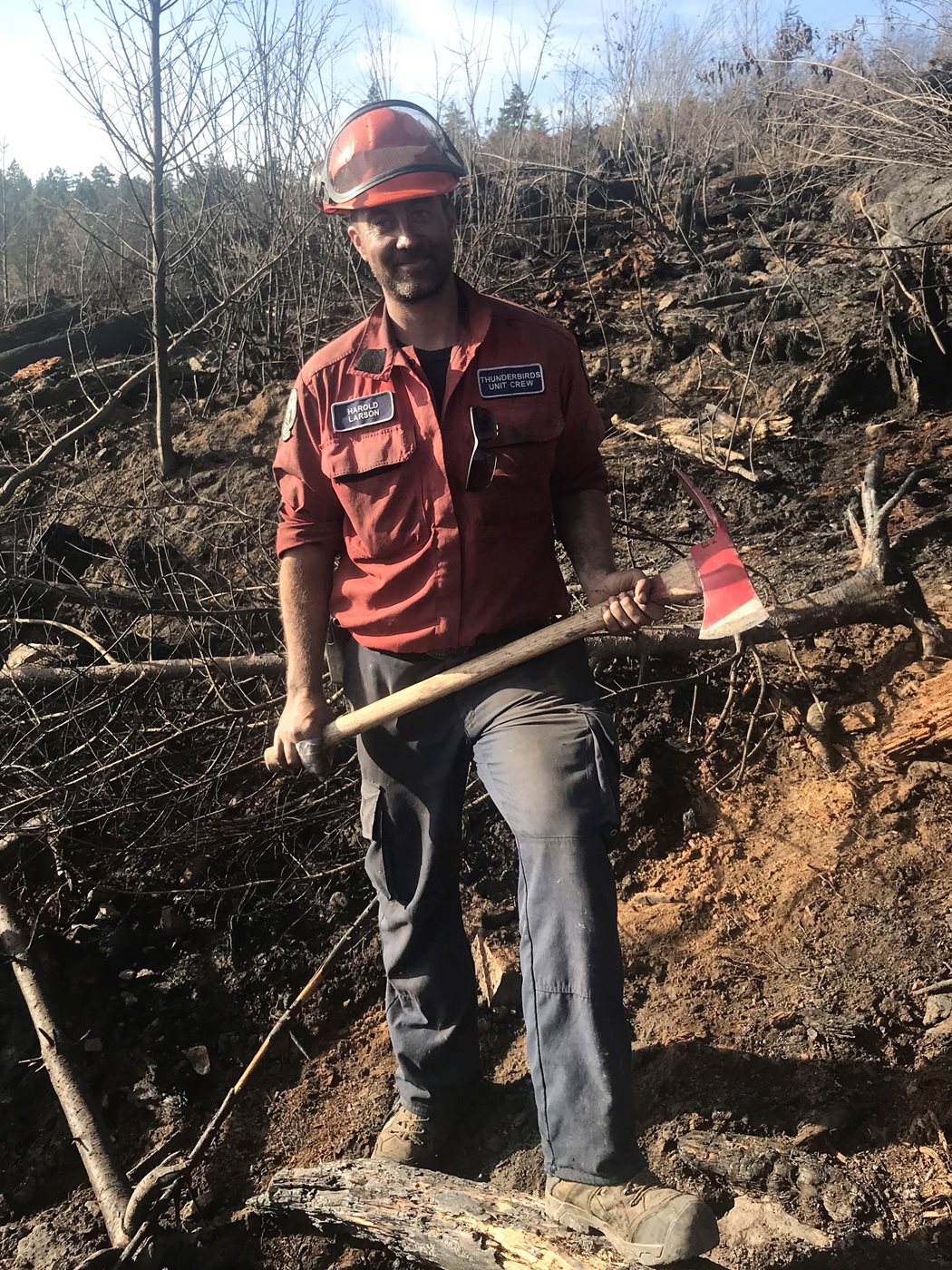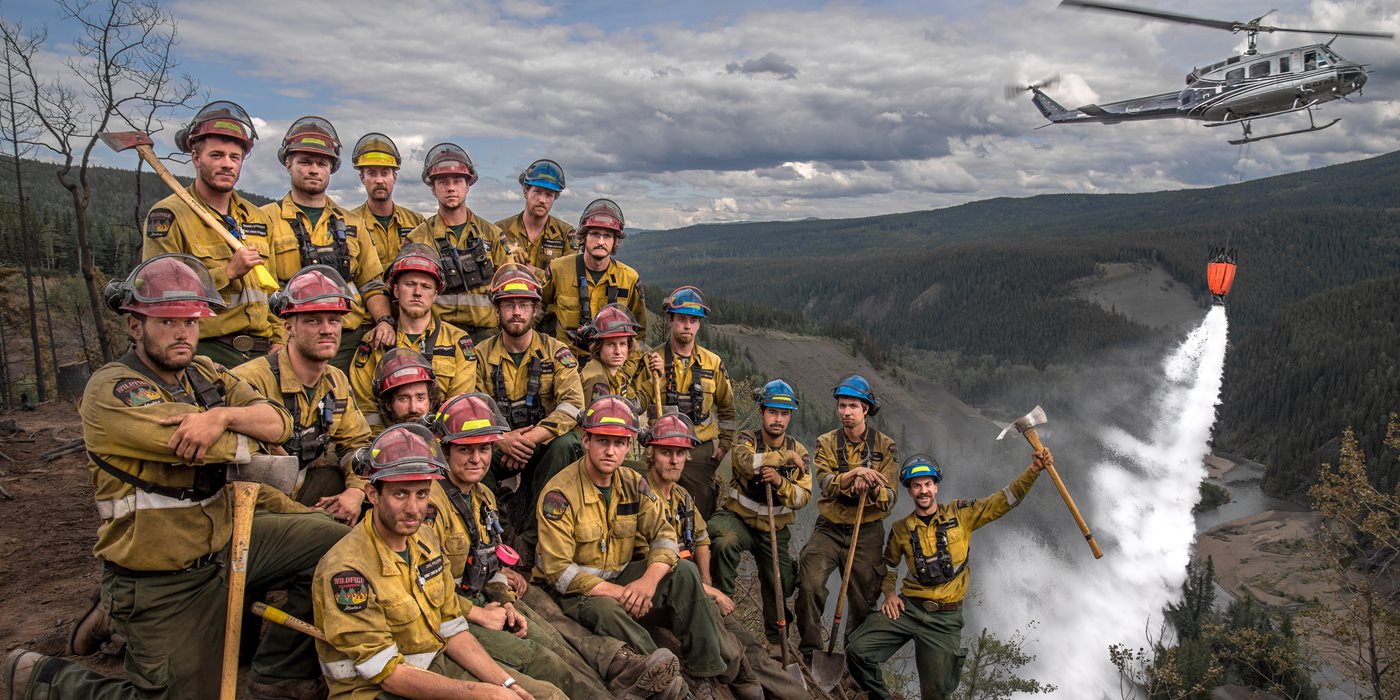Published on February 16, 2021
Harold Larson receives 2020 Spirit of NAIT Alumni Award
It takes a certain individual to brave the sort of work Harold Larson (Forest Technology ’13) has made his profession over the past 20 years.
“Professional,” “respectful,” “loyal” and “persistent” are among the words friends and colleagues use to describe the veteran wildland firefighter. These are also the characteristics that have made him resilient and successful on the frontlines of a physically and mentally exhausting – and sometimes dangerous – job.
Over the years, Larson has fought hundreds of wildland fires across Canada and the U.S. His desire to help people has even seen him travel Down Under to fight a fire so deadly and fierce he wrote a book about it.
“There’s no way I would have been able to do what I’ve done every day for 20 years unless I loved my job,” Larson says. “Definitely a lot of success comes with passion.”
An intense summer job
 Larson landed his first firefighting job – a summer contract position – in 2000, as a 16-year-old living in British Columbia. He enjoyed the experience so much, he kept coming back every spring.
Larson landed his first firefighting job – a summer contract position – in 2000, as a 16-year-old living in British Columbia. He enjoyed the experience so much, he kept coming back every spring.
“As a young guy, it was an adventure. You get shipped off to wherever [needed] in the province or in the [U.S.]. You’re always doing something different and meeting different people,” says Larson.
After several seasons on the frontlines in northwest Alberta – including as leader of a helitack crew, responsible for initial fire attack with helicopters – Larson decided to take his career to the next level.
“You’re not just fighting a fire, you’re protecting sensitive environments or protected species."
By studying Forest Technology at NAIT, Larson could qualify for leadership roles. It also deepened his understanding of biodiversity and forest sustainability – knowledge that would make him a better firefighter.
“You’re not just fighting a fire, you’re protecting sensitive environments or protected species,” he explains.
Instructor Chris Klitbo, who nominated Larson for the Spirit of NAIT Alumni award, remembers him as a classroom standout.
“Harold is a good example of someone who sees the big picture. He used what he learned to gain a different perspective.”
Facing the heat
After graduation, Larson was hired to lead a 20-person firefighting squad, called a unit crew, in Peace River. It was the first of its kind for the district, although similar crews had been established to respond to larger, more intense fires and natural disasters elsewhere in Alberta.
The job often requires working 12- to 16-hour days for 2 or 3 weeks at a time, often in potentially dangerous, high-stress situations. During the crew’s first year, in 2013, they prevented a fire from burning down the town of Nordegg. In following years, Larson and his team were deployed to fight fires throughout Western Canada and Ontario and helped during the southern Alberta floods.
Learning to lead his team, much like putting out forest fires, did not happen overnight, Larson says.
“You take it one day at a time, and you see different people’s strengths, stressors and trigger points,” he says. “And you learn how to be empathetic and identify with those things to make the crew as good as it can be.”
While in Australia in 2009, Larson signed on to fight the Black Saturday Bushfires in Victoria. It was one of the country’s deadliest wildfires, claiming 173 lives, experiences he recounts in his first book, Fire in the Eucalypts.
“That was a pretty gruelling time as I was a bit younger, so I hadn't really adopted a lot of the coping skills that I do have now,” he says. “I'm glad that was something I got to experience and help out.”
Leading a family
Larson has mentored dozens of men and women during his career, including longtime friend Andrew Farley (Forest Technology ’13). They met as classmates almost a decade ago, and Larson was incident commander when Farley fought his first fire near Peace River.
When Larson needed a change of scenery in 2020 and accepted a new role in structural firefighting in Richmond, B.C., it was Farley who took over as crew leader. Those years of mentorship helped fill some “large shoes.”
“One of the lessons he gave me was to focus on that team aspect and think of your crew as not so much as work, but as a family,” says Farley.
 Harold Larson (pictured in yellow helmet) as a unit crew leader on site of a fire located outside Peace River, Alberta.
Harold Larson (pictured in yellow helmet) as a unit crew leader on site of a fire located outside Peace River, Alberta.
“The men and women that do that job, the amount of time and sacrifice involved, they are very tough-minded individuals.”
Looking back on his career, Larson says he learned as much from his crew as he taught them. In fact, the experiences they shared during his time as crew leader shaped his second book, which is in development.
“The men and women that do that job, the amount of time and sacrifice involved, they are very tough-minded individuals,” says Larson. “It was probably one of the hardest jobs I’ll ever do in my life.”
Spirit of NAIT Alumni Award
Harold Larson received the Spirit of NAIT Alumni Award for his work on the frontlines and mentorship within the forest technology profession. It is awarded to alumni who have made exceptional advances or achievements in their career within 12 years of graduation.
Firefighter shares lessons learned battling wildfires
Braving the frontlines of raging wildfires
Harold Larson receives 2020 Spirit of NAIT Alumni Award.
Share on Facebook